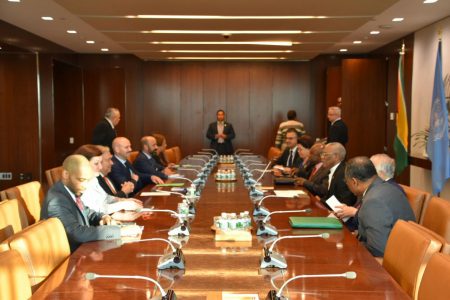President David Granger has reiterated his Government’s commitment to the course of action outlined by former United Nations (UN) Secretary-General, Ban Ki-moon regarding the Guyana-Venezuela controversy.
According to a statement from the Ministry of the Presidency yesterday, he made this clear during his meeting with incumbent Secretary-General, António Guterres on Monday.
The statement said that in an interview in New York yesterday, the President said that the engagement with Guterres offered an opportunity to seek clarification and to be updated on the progress thus far. “(Monday’s) meeting was largely what you will call a situational report and a commitment on the part of Guyana to remain engaged…We will continue to exchange views with the intention of bringing this matter to a successful closure,” President Granger said.

Before demitting Office last year, the former Secretary-General in his assessment on the way forward, declared that the long-running border controversy with Venezuela would be referred to the International Commission of Jurists (ICJ) if significant progress is not made by the end of 2017 in the ongoing Good Officer process.
Granger said that Guyana has been co-operating fully with the Secretary-General’s Personal Representative in the Good Officer process, Norwegian diplomat, Dag Nylander, who has been working closely with the Guyanese and Venezuelan Governments. Nylander was present at the talks in New York on Monday.
Over the last few years, Guyana has argued for a juridical settlement of the controversy, contending that decades of the Good Officer process have resulted in no progress but have allowed Venezuela to interfere with Guyana’s development. Venezuela has been pressing for a continuation of the Good Officer process.
In his address to world leaders at the 72nd Session of the United Nations General Assembly, Granger called on the international community to ensure that Venezuela is not allowed to thwart the processes of judicial settlement of a long-running border controversy with Guyana.
“’Striving for peace’ and the right to development have been Guyana’s deepest concerns since Inde-pendence 1966,” Granger noted. He reminded the Assembly that a year ago he had explained the dangers Guyana has been facing on its borders as a consequence of the territorial claims of its western neighbour.
“The Venezuelan claim persists after fifty-one years of Independence. An eminent international Arbitral Tribunal provided ‘a full, perfect and final settlement’ 118 years ago in 1899. Venezuela denounced that Arbitral Award in 1962 at the Decolonisation Committee of this Assembly as British Guiana strove for its Independence,” Granger, a historian, informed the gathering.
“Guyana warns the world, through this Assembly, that peace will be at stake in our region if justice does not become ascendant, not only within Venezuela, but also in respect to its border controversy with Guyana.
“Four UN Secretaries-General have been seized of the Venezuelan claims. The choice has become one between just and peaceful settlement in accordance with international law, and a Venezuelan posture of attrition that is increasingly more blustering and militaristic. In this matter, protraction is the enemy of resolution and the ally of sustained conflict,” the president observed.









